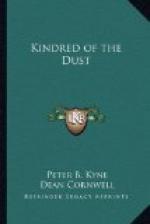After The Laird erected his factory and began to salvage his waste, the slab fire went out forever for lack of fuel, and the modicum of waste from the mill and factory, together with the sawdust, was utilized for fuel in an electric-light plant that furnished light, heat, and power to the town. Consequently, sawdust no longer mercifully covered the trash on the Sawdust Pile as fast as this trash arrived, and, one day, Hector McKaye, observing this, decided that it was an unsightly spot and not quite worthy of his town of Port Agnew. So he constructed a barge somewhat upon the principle of a patent dump-wagon, moored it to the river-bank, created a garbage monopoly in Port Agnew, and sold it for five thousand dollars to a pair of ambitious Italians. With the proceeds of this garbage deal, The Laird built a very pretty little public library.
Having organized his new garbage system (the garbage was to be towed twenty miles to sea and there dumped), The Laird forbade further dumping on the Sawdust Pile. When the necessity for more dredger-work developed, in order to keep the deep channel of the Skookum from filling, he had the pipes from the dredger run out to the Sawdust Pile and covered the unsightly spot with six feet of rich river-silt up to the level of the piling.
“And now,” said Hector McKaye to Andrew Daney, his general manager, “when that settles, we’ll run a light track out here and use the Sawdust Pile for a drying-yard.”
The silt settled and dried, and almost immediately thereafter a squatter took possession of the Sawdust Pile. Across the neck of the little promontory, and in line with extreme high-water mark on each side, he erected a driftwood fence; he had a canvas, driftwood, and corrugated-iron shanty well under way when Hector McKaye appeared on the scene and bade him a pleasant good-morning.
The squatter turned from his labor and bent upon his visitor an appraising glance. His scrutiny appearing to satisfy him as to the identity of the latter, he straightened suddenly and touched his forelock in a queer little salute that left one in doubt whether he was a former member of the United States navy or the British mercantile marine. He was a threadbare little man, possibly sixty years old, with a russet, kindly countenance and mild blue eyes; apart from his salute, there was about him an intangible hint of the sea. He was being assisted in his labors by a ragamuffin girl of perhaps thirteen years.
“Thinking of settling in Port Agnew?” The Laird inquired.
“Why, yes, sir. I thought this might make a good safe anchorage for Nan and me. My name is Caleb Brent. You’re Mr. McKaye, aren’t you?”
The Laird nodded.
“I had an idea, when I filled this spot in and built that bulkhead, Mr. Brent, that some day this would make a safe anchorage for some of my lumber. I planned a drying-yard here. What’s that you’re building, Brent? A hen-house?”




